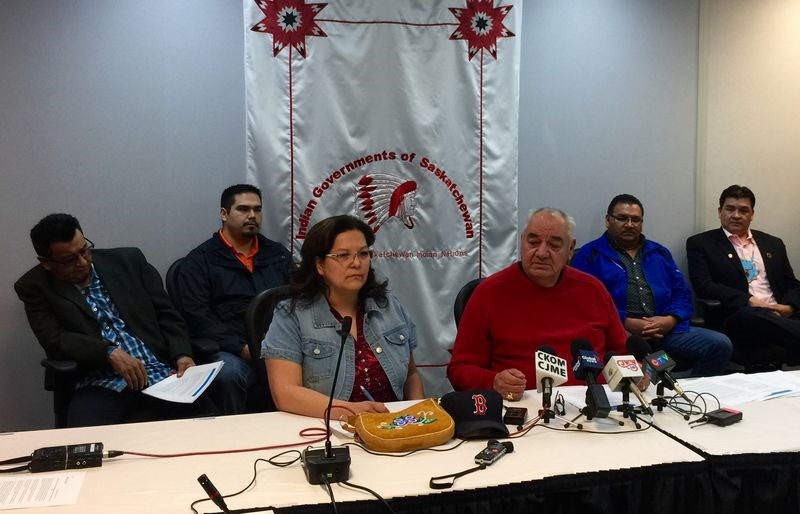A reporter and videographer from CBC Saskatchewan in Regina were in Kamsack last week acquiring information to follow up statements made on March 14 by the chiefs of Cote, Keeseekoose and The Key First Nations.
The three chiefs declared a state of crisis and called for better health care in the face of numerous deaths they attribute to addiction, health and violence issues.
The chiefs sent an open letter Monday to several federal and provincial leaders, including Prime Minister Justin Trudeau and Saskatchewan Premier Brad Wall, declaring the crisis, said a release signed by Senator Ted Quewezance of Keeseekoose First Nation.
“We need help and we need it now,” said Chief Norman Whitehawk of the Cote First Nation. “Our communities are in a constant state of grieving.”
“The deaths and the continual grieving are met with governments fueling the crisis and no plan to intervene perpetuates the ongoing crisis,” the release said. “This cannot continue.”
“On February 27, there were four deaths on the Cote First Nation,” the release said.
“Over the past several years we have had hundreds of deaths in the three communities,” said Chief David D. Cote of The Key First Nation.
“I have a great deal of concern about how our people are dealing with this perpetual grief,” said Chief Lyndon Musqua of Keeseekoose First Nation. “We need adequate resources to help our families deal with the emotional toll this crisis is having on them.”
Kimberly Jonathan, FSIN vice-chief, supports the three communities in their call for better access to health services.
“First Nations face numerous barriers in accessing medical professionals – especially on-reserve,” said Jonathan. “This leads to significant health disparities for First Nations.
“The provincial health system must be equally accessible to all citizens of this province,” she said. “This means needs-based investments focused on ensuring that all who need health service, receive that necessary service.”
The open letter asks the Prime Minister, the Federal Minister of Indigenous Affairs and the Federal Minister of Health along with the Premier of Saskatchewan, the Provincial Health Minister and the Chair of the Sunrise Health Region to attend a health planning and intervention meeting in the community as soon as possible.
The provincial Ministry of Health and the Sunrise Health Region funded a methadone clinic in Kamsack without consulting the three First Nations, the release said. In a Health Canada report written by Dr. John Elias, a Health Canada consultant, he reports that many of the addictions problems escalated with the establishment of the methadone clinic.
“The drug methadone has had a profound impact on the community,” Quewezance said. “The federal and provincial governments have become the pushers of drugs as they fund narcotics and opioids under the government drug plans.
“They track prescription drug use and abuse but do nothing to stop the problem,” he said. “Ask Health Canada how much they spend. They will tell you exactly how much is spent. Government officials know the extent of the problem. The leaders are angry because every problem lands on their doorstep.”
The health issues faced by the three communities are well known in the mainstream health system, the release said. The solutions are already С����Ƶ provided to Canadians but not to First Nations patients on reserve. This is health inequality. Indigenous patients are С����Ƶ denied care by С����Ƶ denied access.
“Health Canada gives us education programs and calls it health care,” it said. “The Province of Saskatchewan forces us to access health services that discriminate against Indigenous patients and lead to delay and denial of care.
“We do not have time to wait for jurisdictions to take responsibility for providing primary health care,” it said. “They have an obligation to provide care to our communities.
“Our request is simple. We will convene a meeting where we will work until Health Canada and the province take responsibility for providing essential primary care services on reserve that will have a positive effect on health outcomes.
“Let us be clear. We are not asking for heart transplants to be performed on reserve. We are not asking for something unreasonable. We are asking for health providers who can assess and diagnose. We are asking for health providers who can start and stop medication. We are asking for health providers who can resuscitate and stabilize patients before transfer to a higher acuity health centre. We are asking for basic medical care that has been denied to First Nation patients. This is a right we have for reasonable health services that make a difference in the health outcomes of Indigenous patients.
“What is unique about the request is that the meeting will be convened and not end until these leaders understand the problem, and commit to a solution that both the federal and provincial governments will agree to implement.”
Jane Philpott, the federal Health Minister, called the deaths tragic and said the Canadian government is willing to work with chiefs, as well as the province, to improve health conditions in the communities.
"My heart goes out to these communities as they deal with something that for most Canadians is unimaginable," Philpott said in a statement. "Our Government has made it very clear that it is taking a new approach to resolving these long standing problems and is committed to a renewed, nation-to-nation relationship based on recognition of rights, respect, co-operation, and partnership."
A spokesperson for the Saskatchewan government said Greg Ottenbreit, the province’s rural and remote health minister, met with leaders several weeks ago and would accept an invitation for further meetings.
The Sunrise Health Region said officials frequently meet with the communities' chiefs. The region "welcomes the opportunity to continue our joint discussions," a statement read.




